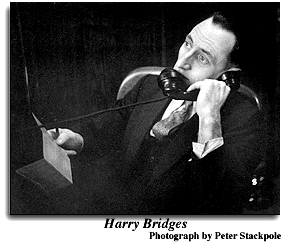FOR about three years, week-after
week, the News-Letter has been charting the career of Harry Bridges—Super
Communist.
 During this period this paper and its editors have been harassed by the
“Reds,” in some manner, almost daily. During this period this paper and its editors have been harassed by the
“Reds,” in some manner, almost daily.
Harry Bridges is not to
be taken lightly; he has the cunning of the fox and is as subtle in his
decomposing approach as the master trickster attorney.
Bridges is as insidious
as a cancer. He reaches his goal thorough the use of soft, dulcet tones
and velvet touches. He has, like the cancer, impregnated industrial bodies
before opposition could be properly formed.
Approximately three years
ago, Henry Schmidt, Harry’s chief lieutenant, acknowledged that
both he and the Auckland Adder were Communists. Schmidt carried his utter
disregard for the benefits of citizenship to the point where he retorted
to a pointed question on patriotism: “Harry does not have the time
to bother about citizenship; there are more important things to take care
of. The men must be handled properly.”
In answer to query as to
why he, Schmidt, and Harry did not go to Russia, he answered: “We
wish we could.”
Schmidt vouchsafed the statement:
“You can never deport Harry. He is too valuable to his people and
he is too smart for any of these fellows around here.”
There has been a strange
apathy demonstrated when the question of deporting Bridges has arisen.
So-called prominent men accused this paper of carrying things too far.
The question as to the value of “the man from down under”
has arisen a number of times. And the question did not come from labor
circles.
It was left to good solid
Americans, of the two-fisted variety, to get to the bottom of this cancerous
growth on the body politic; men who have and had patriotic ideals as their
standards; men who clung to the American Federation of Labor, refusing
to join the un-American C.I.O.
Communism has made itself
felt in every walk of life. You cannot, in safety, question it, whether
you are in a social gathering or a business caucus; whether you are at
play or working in your garden, or whether you are talking to strangers
or neighbors.
Only a few members of the
C.I.O are active Communists, and only a few belonging to it, are really
sympathetic to its teachings. Still, as those who belong to it pay dues,
they feel it incumbent upon themselves to argue in its favor. The same
thing applies to the neighbor or the man in the street generally. They
take sides and argue its virtues. This is precisely what the king-pins
in Moscow want. They know that public arguments always wind up in some
sort of trouble. And, as trouble is the focal point of the entrance to
“Red” circles, the actual Communist of tomorrow is in the
making when trouble starts.
Each real American you speak
with, agrees that Bridges should be deported. Each employer hopes he will
be deported. But few of the employing class care to risk further destruction
of their business by openly declaring themselves. And so it is left to,
and has been taken up by the laboring man himself — witness the
present investigation — an A.F.L. movement entirely.
When Harry Bridges is on
his way to either Moscow or Auckland, the people of this country will owe
the new peace conditions, inevitable through his removal, to this labor
organization. As a measure of protection to itself and appreciation of
the constructive move, capital generally should stand squarely behind the
A.F.L, and its aims and objects.
Round table discussions
between the leaders of the American organization and captains of industry
should be in order now.
The handwriting on the walls
shows the end of C.I.O.-ism. Americanism will hold sway from now on, due
to the co-operation with the A.F.L., of the American Legion and the Americans
who have had the courage to fight on in the face of repeated set backs.
Harry Bridges will be deported
within six months of this date — the delay will be due solely to
the strings of red tape to be cut.
And then, in quick order,
thousands of alien Communists, Nazis and Fascists will be given passage
to the lands they seem to love so much better than they do this free, over-patient
country.
NEWS LETTER and Wasp
August 19, 1938
Return
to top of page
|